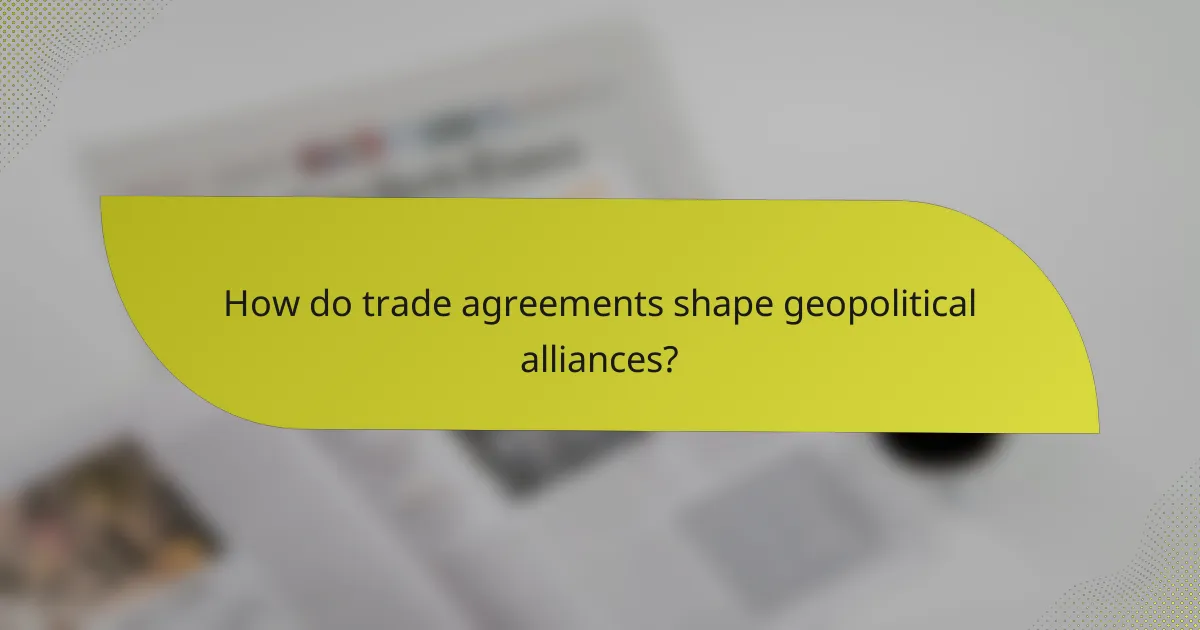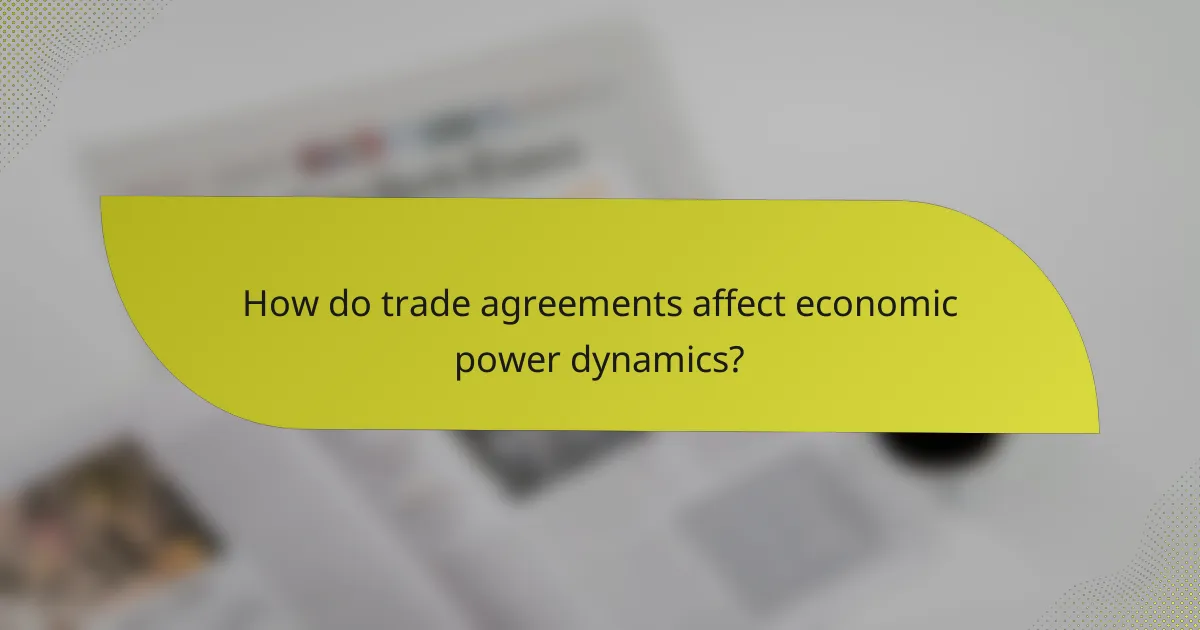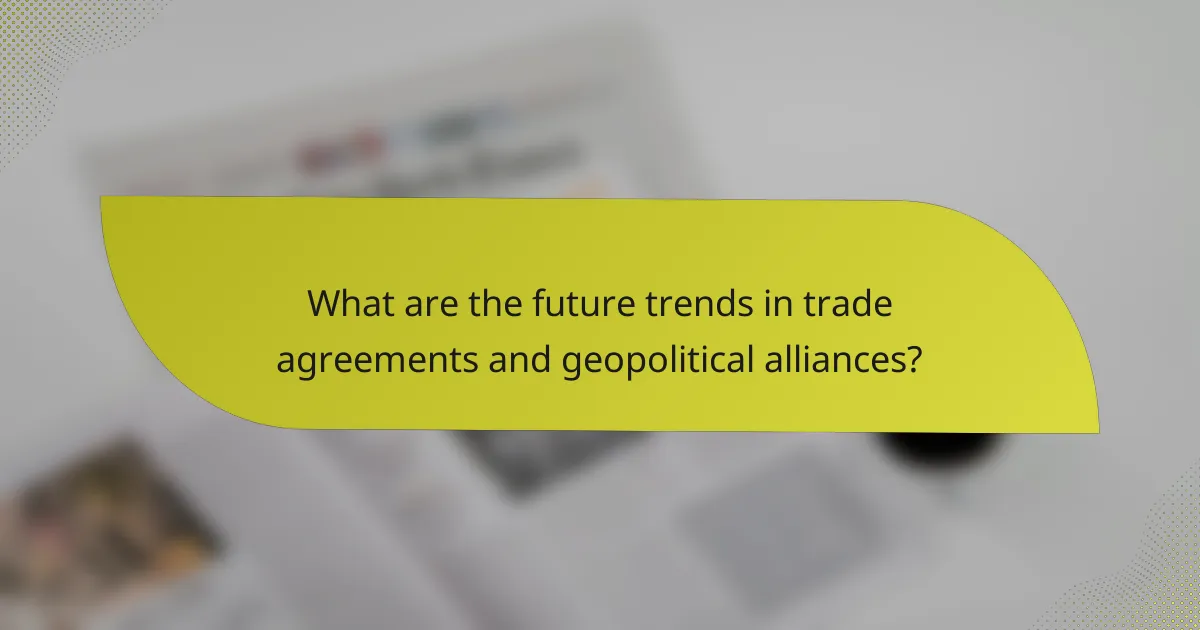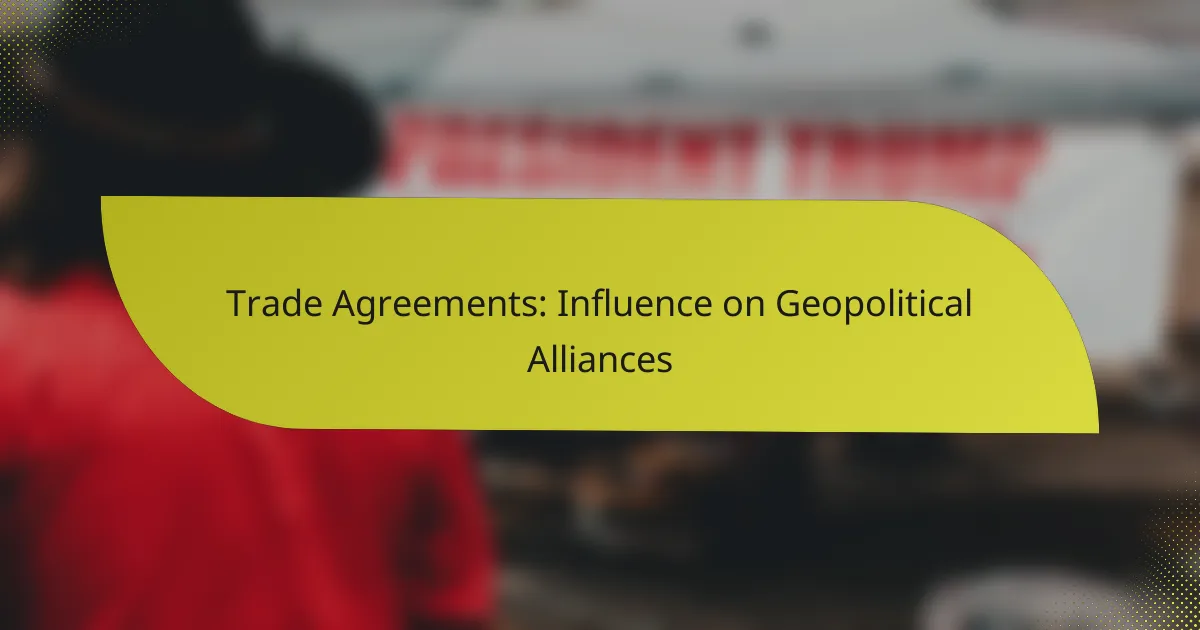Trade agreements play a crucial role in shaping geopolitical alliances by fostering economic interdependence and collaboration among nations. By establishing regulatory standards and enhancing diplomatic ties, these agreements not only influence national economies but also create frameworks for military cooperation, thereby reshaping the strategic landscape of international relations.

How do trade agreements shape geopolitical alliances?
Trade agreements significantly influence geopolitical alliances by fostering economic interdependence and collaboration among nations. These agreements can enhance diplomatic ties and create frameworks for military cooperation, ultimately shaping the strategic landscape of international relations.
Influence on diplomatic relations
Trade agreements often serve as a foundation for stronger diplomatic relations between countries. When nations engage in trade, they develop mutual interests that can lead to improved communication and collaboration on various issues, including political and social matters.
For instance, countries that have established free trade agreements may find it easier to negotiate on other fronts, such as environmental policies or human rights initiatives. This interconnectedness can lead to a more stable and cooperative international environment.
Impact on military partnerships
Trade agreements can also impact military partnerships by aligning countries with similar economic interests. When nations are economically tied through trade, they may be more inclined to collaborate on defense initiatives and share military resources.
For example, countries involved in a trade agreement may participate in joint military exercises or share intelligence, enhancing their collective security. This can lead to stronger alliances that deter potential threats and promote regional stability.
Examples of strategic alliances
Several strategic alliances have emerged as a result of trade agreements. The North American Free Trade Agreement (NAFTA), now replaced by the United States-Mexico-Canada Agreement (USMCA), not only strengthened economic ties between the U.S., Canada, and Mexico but also fostered closer military cooperation among these nations.
Similarly, the European Union (EU) exemplifies how trade agreements can lead to deeper political and military alliances. EU member states benefit from economic collaboration, which has translated into coordinated defense policies and joint military operations.

What are the key trade agreements influencing global politics?
Key trade agreements significantly shape global politics by establishing economic ties, regulatory standards, and diplomatic relations among nations. These agreements can enhance cooperation, influence geopolitical alliances, and impact national economies.
North American Free Trade Agreement (NAFTA)
NAFTA, implemented in 1994, created a trilateral trade bloc between the United States, Canada, and Mexico. It aimed to eliminate tariffs and promote free trade, which has led to increased economic integration and cross-border investment.
While NAFTA successfully boosted trade among the three nations, it also faced criticism for job losses in certain sectors, particularly manufacturing in the U.S. The agreement was replaced by the United States-Mexico-Canada Agreement (USMCA) in 2020, which updated provisions to address modern trade issues.
Comprehensive and Progressive Agreement for [censured]-Pacific Partnership (CPTPP)
The CPTPP is a trade agreement involving 11 countries across the Asia-Pacific region, designed to reduce tariffs and foster economic cooperation. It emerged after the U.S. withdrawal from the original [censured]-Pacific Partnership (TPP) in 2017, focusing on trade liberalization and regulatory coherence.
This agreement allows member countries to strengthen their economic ties and counterbalance China’s influence in the region. By promoting trade in goods and services, the CPTPP aims to enhance competitiveness and economic growth among its members.
European Union Trade Agreements
The European Union (EU) has established numerous trade agreements with countries and regions worldwide, promoting free trade and economic collaboration. These agreements often include provisions on tariffs, services, investments, and regulatory alignment.
For instance, the EU’s trade agreement with Canada (CETA) eliminates most tariffs and fosters a closer economic relationship. Such agreements not only enhance trade but also serve as tools for the EU to exert geopolitical influence and promote its regulatory standards globally.

How do trade agreements affect economic power dynamics?
Trade agreements significantly influence economic power dynamics by shaping the relationships between countries, affecting their market access and competitive advantages. These agreements can lead to shifts in supply chains, alter market access for goods and services, and impact the overall health of national economies.
Shifts in global supply chains
Trade agreements often lead to realignments in global supply chains as countries seek to optimize production costs and efficiency. For instance, a country may become a preferred manufacturing hub due to reduced tariffs or improved trade relations, prompting businesses to relocate their operations there.
These shifts can create dependencies on specific regions for certain goods, which can be both beneficial and risky. Countries that establish themselves as key players in supply chains can gain significant leverage in negotiations and economic influence.
Changes in market access
Market access is directly affected by trade agreements, as they typically reduce or eliminate tariffs and trade barriers. This allows countries to export their goods more competitively, increasing their market share in foreign countries.
For example, a trade agreement between the European Union and a developing country can open up EU markets to that country’s agricultural products, boosting local economies. However, it may also expose domestic industries to increased competition, necessitating adjustments to maintain viability.
Effects on national economies
The overall effects of trade agreements on national economies can vary widely. Countries that successfully leverage trade agreements often experience economic growth, job creation, and increased foreign investment. Conversely, those that fail to adapt may face economic challenges, such as job losses in certain sectors.
It’s crucial for policymakers to consider the long-term implications of trade agreements, including potential shifts in labor markets and industry competitiveness. Regular assessments and adjustments can help mitigate negative impacts while maximizing economic benefits.

What role do emerging markets play in trade agreements?
Emerging markets significantly influence trade agreements by enhancing global trade dynamics and creating new economic partnerships. Their growing economies and increasing participation in international trade reshape geopolitical alliances and offer opportunities for investment and collaboration.
Increased participation of countries like India
India’s active role in trade agreements reflects its expanding economy and strategic geopolitical interests. As one of the largest emerging markets, India has entered various trade pacts, such as the Regional Comprehensive Economic Partnership (RCEP), which aims to enhance trade with Asia-Pacific nations.
India’s participation in these agreements often focuses on sectors like technology, pharmaceuticals, and textiles, which are vital for its economic growth. By engaging in trade agreements, India seeks to boost exports, attract foreign investment, and strengthen its position in global supply chains.
Influence of African Continental Free Trade Area (AfCFTA)
The African Continental Free Trade Area (AfCFTA) is a landmark initiative that aims to create a single market for goods and services across Africa. This agreement is expected to enhance intra-African trade by reducing tariffs and streamlining trade regulations, which can significantly benefit emerging economies on the continent.
By promoting regional integration, AfCFTA allows African countries to leverage their collective market size, estimated at over 1.2 billion people. This collaboration can lead to increased investment opportunities and improved economic resilience, making African nations more competitive in global markets.

How do trade agreements impact regional stability?
Trade agreements significantly enhance regional stability by fostering economic interdependence among nations. This interdependence often leads to reduced tensions and conflicts, as countries are incentivized to maintain peaceful relations to protect their economic interests.
Reduction of trade conflicts
Trade agreements help reduce conflicts by establishing clear rules and standards for trade, which minimizes misunderstandings and disputes. When countries engage in trade partnerships, they are less likely to resort to aggressive actions, as the economic costs of conflict outweigh potential gains.
For example, the North American Free Trade Agreement (NAFTA) created a framework that encouraged cooperation between the U.S., Canada, and Mexico, leading to a significant decrease in trade-related disputes. Countries involved in such agreements often experience lower tariffs and improved market access, which further incentivizes collaboration over confrontation.
Promotion of cooperative security measures
Trade agreements can also promote cooperative security measures by fostering dialogue and collaboration on shared interests. When nations are economically tied, they are more likely to work together on security issues, such as counter-terrorism and regional stability initiatives.
For instance, the European Union (EU) not only facilitates trade but also encourages member states to cooperate on defense and security policies. This collaboration can manifest in joint military exercises, intelligence sharing, and coordinated responses to regional threats, ultimately enhancing overall stability in the region.

What are the future trends in trade agreements and geopolitical alliances?
Future trends in trade agreements and geopolitical alliances are increasingly shaped by digitalization and sustainability. As nations adapt to global challenges, these trends reflect a shift towards more integrated and responsible economic relationships.
Rise of digital trade agreements
The rise of digital trade agreements is transforming how countries engage in commerce. These agreements focus on facilitating cross-border data flows, protecting intellectual property in the digital realm, and addressing e-commerce regulations.
Countries are beginning to prioritize digital trade in their negotiations, with examples like the Comprehensive and Progressive Agreement for [censured]-Pacific Partnership (CPTPP) including provisions for digital trade. This trend is expected to expand, particularly as more businesses operate online.
Increased focus on sustainability
There is a growing emphasis on sustainability within trade agreements, reflecting global concerns about climate change and environmental degradation. Countries are increasingly incorporating environmental standards and commitments into their trade negotiations.
For instance, agreements may now include provisions for reducing carbon emissions, promoting renewable energy, and ensuring sustainable resource management. As nations strive to meet international climate goals, this focus on sustainability is likely to become a standard feature of future trade agreements.
